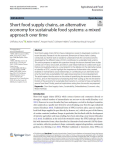Chiffoleau Y., Wallet F., Prosperi P., Collewet F., Morizot-Braud F. (2025). Short food supply chains, an alternative economy for sustainable food systems: a mixed approach over time. Agricultural and Food Economics, 01/12/2025, vol. 13, n. 1, p. 66.
https://doi.org/10.1186/s40100-025-00403-4
https://doi.org/10.1186/s40100-025-00403-4
| Titre : | Short food supply chains, an alternative economy for sustainable food systems: a mixed approach over time (2025) |
| Auteurs : | Y. Chiffoleau ; F. Wallet ; P. Prosperi ; F. Collewet ; F. Morizot-Braud |
| Type de document : | Article |
| Dans : | Agricultural and Food Economics (vol. 13, n. 1, December 2025) |
| Article en page(s) : | p. 66 |
| Langues : | Anglais |
| Langues du résumé : | Anglais |
| Catégories : |
Catégories principales 11 - COMMERCE ; 11.2 - Commercialisation. DistributionThésaurus IAMM CIRCUIT COURT ; CHAINE D'APPROVISIONNEMENT ; DURABILITE ; ANCRAGE TERRITORIAL ; CHAINE ALIMENTAIRE ; CIRCUIT DE DISTRIBUTION ALTERNATIF ; FRANCE |
| Résumé : | Short food supply chains (SFSCs) have undergone a revival in developed countries in recent decades. Research into the economic dimension of these chains is being conducted, but further work is needed to understand how the concrete economy developed by the different types of SFSCs contributes to sustainable food systems. This article proposes to explore this question through the lessons learned from studies carried out in France since 2009, and which used mixed methods to collect both quantitative and qualitative data. As a counterpoint to the debates on the alternative nature or hybridity of SFSCs, results highlight the importance of alternative rules, created, enabled or maintained by social relationships, in contributing to an alternative economy that promotes sustainability, from agricultural practices to local development. The article opens the discussion on the value of quantifying the economic dimension of SFSCs, and on the importance of analyzing how their scaling up fits into the diversification of the economy for sustainable food systems in a context of new competition around ‘local food’. Finally, practical implications arising from the results are proposed. |
| Note de contenu : | Project DIVINFOOD (Grant Agreement n. 101000383), Project COREnet (Grant Agreement n. 101060905), Project SWITCH (Grant Agreement n. 101060483), Casdar, ANR-23-PESA-005 |
| Cote : | Online |
| URL / DOI : | https://doi.org/10.1186/s40100-025-00403-4 |







